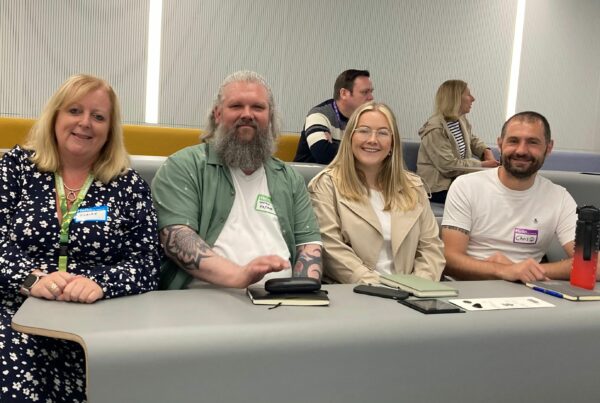Our Training Lead, Andrea Wallman, brings together tips for looking after your mental health. She draws on her insight from having worked with businesses and individuals to deliver our mental health training, as well as her own experiences of looking after her mental wellbeing.
We know that mental wellbeing is a complex and ever-changing thing – don’t see this as a to-do list, but a list of things for you to try as and when you are able. Even if you take one thing from this list, that’s enough.
Many of us can feel overwhelmed and stressed; life is busy, and we need to look after our mental health just like we do our physical health. Noticing when your mental health, or that of a colleague or friend, is declining is key to getting it back on track.
This blog is more a reminder of those small things that can help us to survive life’s busy periods. I have often felt tired, overwhelmed, and stressed and then reflected on my daily habits over the last week that normally keep me well, only to realise I’d stopped doing some, or all, of them.

- The basics – what we eat, and drink, really does affect our mood, great podcast here. Not being hydrated, drinking more caffeine, or alcohol, than normal, (this can increase anxiety and low mood for some people) can really affect how we feel. Having a deadline for drinking caffeine can help, or rotating caffeine, water and herbal tea or juice can work for some. Being aware that when we are busy our bodies will crave carbohydrates, they provide quick energy and lower cortisol (stress hormones) levels, this is particular important for women or menstruating people
- Notice those ANTs – ANTs is an acronym for Automatic Negative Thoughts. We need to notice them and squash them! We are often our own worst critic and never take the advice and empathy we offer others, so if you find yourself being self-critical think how you would talk to your best friend if they were in your situation, have some self-compassion. Reframe unhelpful thoughts can be beneficial for our mental health, this clip shows how Catch it, check it, change it.
- Do something for you – we often forget that looking after our own mental health is important, especially if support others, colleagues or family members and friends. Everyone’s mental health is important, so book that massage, go for a walk, or do something you enjoy, and that you know improves your mental health.
- Connect – Connect with people you like, such as friends and colleagues that lift you up. Being surrounded by like-minded people, with similar energy, can lift your spirits and boost your feel-good hormones. If your friends are huggers, then having a hug for at least 30 seconds releases oxytocin (the hormone of love) it gives you that warm fuzzy feeling, reduces blood pressure, stress and anxiety and helps regulate emotions see benefits-of-hugging
- Sort your sleep – Sleep is so important, practicing good sleep hygiene (yes, that’s a term) as your brain literally gets washed whilst you sleep, and we all know how we feel when we get a good night’s sleep, our perspective can improve so much. Understanding sleep, what helps and hinders it, is a great start to tweaking your bedtime routine and benefiting from a restful night, this 5 minute ted talk on sleep science is a great place to start, I’d highly recommend ‘Why we sleep’ by Matthew Walker.
- Be in the now – Mindfulness is ‘paying attention on purpose’ being present in the here and now, not thinking about the past, or the future. This takes practice, but you can start from just 1 minute per day. The Balance app is currently FREE, and helps you meditate and learn about the benefits of meditation for your whole life. I promise it’s not about making your mind go blank. There is so much research to back up the benefits.
- Connect with nature and get moving – Get outside, the change in scenery, fresh air and physical activity will help to lift your mood. If you’re prone to eating your lunch at your desk, ask a colleague to go for a walk, even 5 minutes will help. Find a physical activity you enjoy that can help decrease your stress levels, run, walk, swim or play a team sport are all beneficial.
- Ask for help – this one is listed last, but certainly not least. We all experience mental ill health, just like physical health and talking to someone can make things so much better. Sometimes a cup of tea (Yorkshire, of course) and verbalising how you feel may be all you need to help find a way forward. That may include: Counselling support via your GP, contacting the Samaritans, looking up information on the Mind website or accessing an Employee Assistance Programme at work. Talk to a trusted friend, family member, manager or colleague if you need help to access any of these.
Thank you to Andrea for sharing her top tips and experiences.
You can find out more about our mental health training offer by visiting the webpage, or contacting Leeds Mind via email: training@leedsmind.org.uk or telephone: 07715 415873



